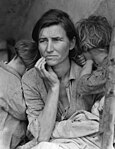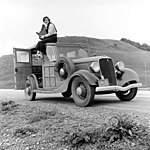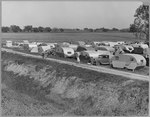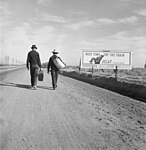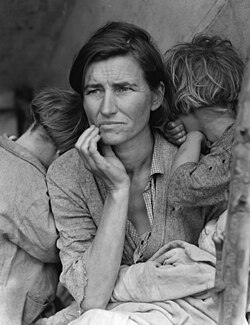Dorothea Lange
| Dorothea Lange | |
 Dorothea Lange på taget av sin Ford Model 40 stationsvagn, 1936. Foto: Rondal Partridge. | |
| Födelsenamn | Dorothea Nutzhorn |
|---|---|
| Födelsedatum | 26 maj 1895 |
| Födelseplats | Hoboken, New Jersey, USA |
| Dödsdatum | 11 oktober 1965 (70 år) |
| Dödsplats | San Francisco, Kalifornien, USA |
| Genre | Dokumentärfotografi, fotojournalistik |
| Aktiv | 1918–1965 |
Dorothea Lange, ursprungligen Dorothea Margaretta Nutzhorn, född 26 maj 1895 i Hoboken i New Jersey, död 11 oktober 1965 i San Francisco i Kalifornien, var en amerikansk fotograf.
Biografi
Dorothea Lange drabbades som sjuåring av polio, vilket resulterade i ett försvagat högerben. Fadern övergav familjen, innefattande även en yngre son, när hon var tolv år gammal. Som ung antog hon moderns efternamn Lange. Hon bestämde sig för att bli fotograf efter high school och praktiserade på flera fotoateljéer i New York, bland annat Arnold Genthes (1869–1942). Hon studerade också fotografi vid Columbia University i New York för Clarence H. White. År 1918 slog hon sig ned i San Francisco, där hon så småningom kunde öppna en porträttfotoateljé. Hon var mellan 1920 och 1935 gift med målaren Maynard Dixon (1875–1946); paret fick två söner. Hon skiljde sig 1936 och gifte om sig med nationalekonomen Paul Schuster Taylor. Under fem år dokumenterade de tillsammans fattigdomen på den amerikanska landsbygden och ekonomisk exploatering av torpare och migrantarbetare.
Migrant mother
- Huvudartikel: Migrant Mother
Dorothea Langes mest berömda fotografi är Migrant Mother, taget i början av mars 1936, föreställande den 32-åriga sjubarnsmamman Florence Owens Thompson. Lange hade börjat som konventionell porträttfotograf men, upprörd över den ekonomiska depressionens effekter, började hon 1934/1935 att ta dokumentära bilder av hemlösa och arbetslösa för California State Emergency Relief Administration, vilken 1935 övertogs av federala myndigheten Resettlement Administration.[1]
Eftermäle
Nedslagskratern Lange på planeten Merkurius är uppkallad efter henne.[2]
Bilder
- Dorothea Lange på sin bil, en Ford Model 40 stationsvagn, 1936. Kameran är en Graflex. Fotot är taget av Rondal Partridge.
- Husvagnar i Stanislaus County i Kalifornien.
- Migranter från Missouri, i Kalifornien.
- Internerade japansk-amerikanska barn på lägret i Manzanar i Kalifornien.
- Plantageägare och barn på plantagen, Mississippi 1937.
- Två arbetslösa till fots på väg till Los Angeles, 1937.
- Ärtplockare i Imperial Valley, Kalifornien.
Bibliografi i urval
- Milton Meltzer: Dorothea Lange: A Photographer's Life , New York 1978
- Linda Gordon och Dorothea Lange: Encyclopedia of the Depression
- Linda Gordon och Gary Okihiro: Impounded: Dorothea Lange and the Censored Images of Japanese American Internment
- Sarah Meister: Sarah Hermanson Meister: Dorothea Lange: Migrant Mother, Museum of Modern Art, New York 2018, ISBN 978-1-63345-066-0
- Sarah Meister: Dorothea Lange: Words + Pictures, Museum of Modern Art, New York 2020
Källor
Noter
- ^ Sarah Hermanson Meister: Dorothea Lange: Migrant Mother, Museum of Modern Art, New York 2018, ISBN 978-1-63345-066-0, inledning, sidan 10
- ^ ”Lange on Mercury” (på engelska). International Astronomical Union. 11 oktober 2016. https://planetarynames.wr.usgs.gov/Feature/14586. Läst 18 januari 2025.
Externa länkar
 Wikimedia Commons har media som rör Dorothea Lange.
Wikimedia Commons har media som rör Dorothea Lange.
Media som används på denna webbplats
Dorothea Lange, Resettlement Administration photographer, in California. The car is a w:Ford Model V8 (more exactly, this one is Model 40). The camera is a Graflex 4x5 Series D.
Portrait shows Florence Thompson with several of her children in a photograph known as "Migrant Mother". The Library of Congress caption reads: "Destitute pea pickers in California. Mother of seven children. Age thirty-two. Nipomo, California." In the 1930s, the FSA employed several photographers to document the effects of the Great Depression on the population of America. Many of the photographs can also be seen as propaganda images to support the U.S. government's policy distributing support to the worst affected, poorer areas of the country. Lange's image of a supposed migrant pea picker, Florence Owens Thompson, and her family has become an icon of resilience in the face of adversity. However, it is not universally accepted that Florence Thompson was a migrant pea picker. In the book Photographing Farmworkers in California (Stanford University Press, 2004), author Richard Steven Street asserts that some scholars believe Lange's description of the print was "either vague or demonstrably inaccurate" and that Thompson was not a farmworker, but a Dust Bowl migrant. Nevertheless, if she was a "Dust Bowl migrant", she would have left a farm as most potential Dust Bowl migrants typically did and then began her life as such. Thus any potential inaccuracy is virtually irrelevant. The child to the viewer's right was Thompson's daughter, Katherine (later Katherine McIntosh), 4 years old (Leonard, Tom, "Woman whose plight defined Great Depression warns tragedy will happen again ", article, The Daily Telegraph, December 4, 2008) Lange took this photograph with a Graflex camera on large format (4"x5") negative film.[1]
Image by Dorothea Lange. The owner of the Aldridge Plantation with one of the plantation children. Vicinity of Leland, Mississippi.
- Scope and content: The full caption for this photograph reads: Manzanar Relocation Center, Manzanar, California. Baseball is the most popular recreation at this War Relocation Authority center with 80 teams having been formed throughout the Center. Most of the playing is done between the barrack blocks.
Tracy (vicinity), California. Missouri family of five who are seven months from the drought area on U.S. Highway 99. "Broke, baby sick, and car trouble!" (LOC description) N.B. The sign just visible in front of the truck confirms the other version on the LoC site is correct, not the mirror image version seen in the original scan this is based on.
- Scope and content: Full caption reads as follows: 2 1/2 miles S.E. of Westley, Stanislaus County, San Joaquin Valley, California. Trailer section of labor contractor's camp opening of pea season.
Toward Los Angeles, California, 1937 Mar.
1 negative : nitrate ; 2 1/4 x 2 1/4 inches or smaller.
Notes:
Photo shows two people walking (hitchhiking?) along road near a billboard that says "Next time, try the train. Relax."
Title and other information from caption card.
Transfer; United States. Office of War Information. Overseas Picture Division. Washington Division; 1944.
Subjects:
Hitchhiking.
Migrants--California
United States--California.
Format: Nitrate negatives.
Rights Info: No known restrictions on publication.
Repository: Library of Congress, Prints and Photographs Division, Washington, DC 20540 USA, http://hdl.loc.gov/loc.pnp/pp.print
Part Of: Farm Security Administration - Office of War Information Photograph Collection
More information about the FSA/OWI Collection is available at http://hdl.loc.gov/loc.pnp/pp.fsaowi
